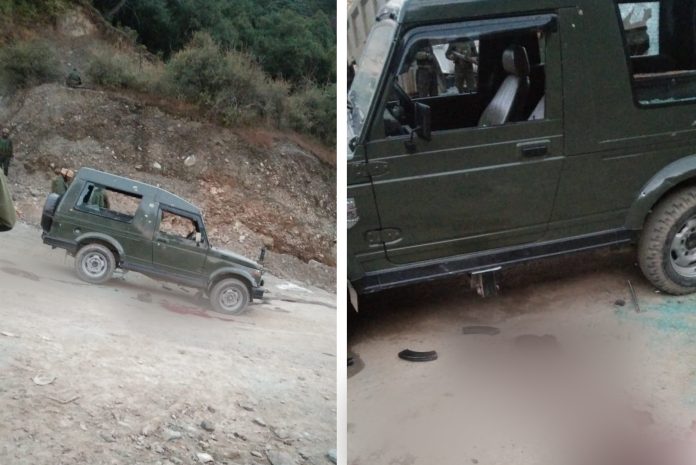In another attack, marking the fourth such tragedy this year within the twin border districts of Rajouri and Poonch, five valiant soldiers met their martyrdom, while two others sustained injuries in a fierce encounter with terrorists at Dhatyar Morh. This perilous engagement unfolded between Dera Ki Gali and Bufliaz, falling under the jurisdiction of Surankote police station in the Poonch district. A reconnaissance of the area allowed the assailants to select a location surrounded by mountains and filled with pits. As the security forces conduct extensive search operations, the region remains on high alert, with authorities striving to gather intelligence and neutralise the terrorists involved.
The attacks on the Army in these border districts underscore the urgency of addressing the complex security challenges posed by infiltrating militants. This latest assault on army vehicles lays bare the hostile circumstances security forces face within the twin districts of Rajouri and Poonch. The disconcerting reality is that terrorists exhibit an exhaustive knowledge of the entire topography of the Rajouri-Poonch region, precisely selecting both the location and timing of their strikes. Their awareness that the area is enveloped by mountains, coupled with the anticipation of slowed army vehicles navigating challenging road conditions, underscores the strategic advantage exploited by these terrorists. These assailants are astutely cognizant of the army’s movements in the region, signalling a grave concern for any security apparatus. The recurring attacks in this specific locale, surrounded by forests leading to Chamrer and Bhata Dhurian forests, echo a history of successful ambushes, inflicting severe casualties on army personnel before vanishing into the dense foliage. The haunting echoes of an incident two decades ago, where a judge and three others were ruthlessly gunned down in the same area, are a reminder of the heinous methods adopted by terrorists. They spare no one.
In the recent encounter, army vehicles were en route to fortify ongoing search operations based on specific intelligence inputs but unfortunately got trapped, exacting a heavy toll on five army personnel. Every conceivable angle must now be explored, including local support. A paradigm shift in strategy is imperative. Coordinated, large-scale search operations, augmented by drone surveillance and other aerial support mechanisms, should be deployed to scour the forested expanses comprehensively. Tactical decisions at every police station level are requisite in this digital age, where telephonic footprints play a pivotal role in locating and apprehending local collaborators. The support ecosystem sustaining terrorism must be dismantled decisively, necessitating the exposure and neutralisation of local supporters assisting terrorists in executing attacks and evading capture. The introduction of significant pickets at vulnerable junctures, increased security presence to assert regional dominance, and the fortification of intelligence networks are pivotal components of an overarching strategy.
There are clear signs that terrorists have established a broad network of local support, emphasising the need for heightened focus by police and security agencies to dismantle this terrorist ecosystem. Sympathisers within the locals must be singled out, and decisive legal actions should be taken to set a precedent, acting as a formidable deterrent for future transgressions. The terrorists’ tactical approach, evident both in Kashmir and Poonch-Rajouri, centres on targeting members of the minority community and security agencies. Each orchestrated assault elicits a progressively resounding and robust retaliation from the formidable security forces.
The security forces must focus on national highways, including Mughal Road, as they serve as a convenient conduit for terrorists to infiltrate Kashmir, with agencies having successfully dismantled networks of drivers serving as conduits for arms and ammunition. The region has been identified as having ominous links to terror emanating from Dubai. The expansive border with Pakistan renders Rajouri-Poonch an optimal staging ground for terrorist infiltration. These terror attacks are aimed at inflicting an impact on the tourism and developmental prospects of the region. The Government must meticulously assess all facets of this complex issue, necessitating a comprehensive and alternative strategic approach.
The current targeted attacks are temporary, as our security forces are capable of tackling the rising situation. The security agencies have already established dominance in the Kashmir Division, and frustrated by the consistent pressure from the police and security agencies, terrorists are indulging in these cowardly attacks. It is a fact that it will take some time to dismantle the entire terror ecosystem. Gone are the days of grenade and suicide attacks, and the days of these ambush attacks are also short-lived. Time and again, Indian forces have retaliated decisively, including surgical strikes across the border. One must not forget that security agencies have full freedom to make decisions and act as per the situation as and when required. The Indian Army and JKP are professional units and work in tandem to neutralise terrorists; however, efforts are always there to protect people from any collateral damage. Protecting our countrymen is the prime priority, and in the process, the army sometimes suffers. But these sacrifices are not going to go to waste, as security agencies will chalk out a renewed strategy to tackle this peculiar situation as well. The Army has full support from the Government, and all agencies will work together to gather specific intelligence about these terrorists. There are a few of these terrorists, and their days are numbered.
As in the past, perpetrators of such attacks will face their fate along with their sympathisers. Jammu and Kashmir Police has already declared that any recruitment on behalf of terrorists or sympathy for them will be treated as an act of terrorism. This no-terrorism policy is in force now, and the twin districts of Poonch and Rajouri will also be free from terrorists in the coming months. A multifaceted approach, encompassing extensive CASO operations, enhanced police accountability, and strategic decisions, is imperative. The Jammu and Kashmir Police, in conjunction with the army, possess the capability to navigate any situation, contingent on a paradigm shift in tactics to effectively contend with the evolving threat landscape.
Trending Now
E-Paper


